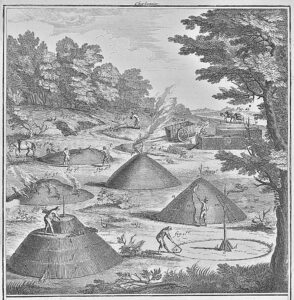La transferencia a España de los conocimientos técnicos sobre el desazufrado del carbón de piedra y la obtención de coques y breas hasta 1790
Llull, 2022, vol. 45, nº 91
The transfer of technical knowledge on the stone coal purification and the obtaining of coke and pitch to Spain until 1790
Luis Aurelio González Prieto, Pelayo González-Pumarino & David González Palomares

DOI
https://doi.org/10.47101/llull.2022.45.91.gonzalez.prieto
Cómo citar
González Prieto, Luis Aurelio, González-Pumarino, Pelayo & González Palomares, David (2022). La transferencia a España de los conocimientos técnicos sobre el desazufrado del carbón de piedra y la obtención de coques y breas hasta 1790». Llull, 45(91), 59-88. <https://doi.org/10.47101/llull.2022.45.91.gonzalez.prieto>
¡Comparte en tus redes!
Resumen
En la segunda mitad del siglo XVIII Gran Bretaña revolucionó el uso de las fuentes de energía al sustituir el carbón de leña por el mineral en los usos domésticos e industriales. Para ello se tuvieron que ensayar diferentes técnicas destinadas a eliminar las materias perjudiciales que este último contenía, fundamentalmente azufre y betunes, lográndose extraer subproductos con alto valor estratégico para la industria naval: breas y alquitranes.
Empleando de forma empírica el carbón mineral depurado para producir hierro colado abundante y barato, los británicos lideraron la primera Revolución Industrial y dotaron a sus Ejércitos de armamento económicamente más asequible. Fue entonces cuando muchos técnicos y naturalistas continentales se interesaron por las nuevas tecnologías. Francia puso el mayor empeño en determinar el fundamento científico de estos procesos. No lo logró, pero las publicaciones de sus técnicos propiciaron la transferencia tecnológica al continente.
España no prestó atención a la depuración del carbón de piedra hasta el último cuarto del siglo XVIII. Los sucesivos gobiernos promovieron el espionaje industrial y la contratación de técnicos en el extranjero, a la vez que se crearon multitud de sociedades económicas de amigos del país entre cuyos fines se encontraban el fomento y difusión de los conocimientos sobre las nuevas técnicas, pero no concurrieron las circunstancias necesarias para que se produjeran avances significativos.
Abstract
In the second half of the 18th century, Great Britain revolutionized the use of energy sources by replacing charcoal for mineral coal in domestic and industrial uses. To do this, different techniques had to be tested to eliminate the harmful materials that the latter contained, mainly sulfur and bitumens, while by-products with a high strategic value for the shipbuilding industry, pitch and tar, were extracted.
By empirically employing purified mineral coal to produce abundant and cheap cast iron, the British were able to lead the first Industrial Revolution and provide their armies with more affordable weaponry. It was then that many continental technicians and naturalists became interested in new technologies. France was the country that tried hardest to determine the scientific basis of these processes. It did not succeed, but the publications of its technicians led to the transfer of technology to the continent.
In Spain, no attention was paid to the purification of mineral coal until the last quarter of the 18th century. The government promoted industrial espionage and the hiring of technicians abroad, while many economic societies of friends of the country were created to encourage and disseminate knowledge about the new techniques, but the necessary circumstances to achieve significant advances were not present.
Palabras clave
Desazufrado del carbón, horno de destilación de carbón, obtención de coques y breas.
Keywords
Coal purification, coal distillation furnace, obtaining cokes and pitches.

